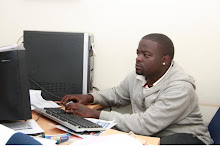
Jason Dunford
It feels great but my work is far from finished. What you have seen so far is only the beginning. I hope to continue with my career and bring more glory to
It has been rather overwhelming but I am beginning to get used to being recognized in public. The media support for Kenyan sportspeople in recent times has been phenomenal and I would like to extend a heartfelt thanks
I have signed a few autographs here and there as well as the occasional photo opportunity. People tend to recognize me more often when I am with my brother as they tend to couple the two of us together.
Well, I knew I had prepared well and was in good shape, having done a lot of hard training at my base in the
I try to stay as relaxed as possible and this has become easier over time as I have learnt to control my emotions. I make sure I arrive at the pool early, about one and a half hours before my first race, and get in a good warm up (about 2000 metres). I will practice a few sprints, then dry off, confident my body is ready to race. About 15 minutes before my race I put on my racing suit and make sure it is comfortable. I then try and find the mental zone that I know enables me to race fast.
My father was a big influence and started my brothers and me swimming at a very young age. I swam in my first competition at the age of five. At age eight I represented the
Certain people have more talent for swimming than others but a lot of training is still required. Thus I would say it is a combination of talent and hard work but hard work is the over riding factor.
Mon: 6.30-8.15 amàswim, 2.30-5.30pm dry land training followed by swim
Tue: 2.30-5.30pm stretch followed by swim
Wed: 6.30-8.15 am swim, 2.30-4.00pm- swim
Thu: 2.30-5.30pm swim
Fri: 6.30-8.15am swim, 2.30-5.30pmà dry land training followed by swim
Sat: 7.30-9.30am swim
Sun: rest
DietàFor breakfast- Scrambled with bacon, a bowl of uji and some fruit. For lunch- salad or sandwich with some chicken usually. Pasta on occasion as well. For dinner- some sort of meat, chicken or fish, potatoes, vegetables.
Do you find it burdensome, juggling school and sports?
At times it can be but I get amazing support from my parents, girlfriend and teammates. They are always available to reassure me when I doubt myself and that really helps me to get through the rough patches. You also learn ways to adapt and prioritize your time. However it does take a lot of discipline and determination.
Human Biology (major, with a concentration in environmental science and public health) and Kiswahili (minor).
Are there any special sides of swimming that you can highlight to us (lay-men) so we can use to know if a swimmer is racing well or poorly?
It is all in relation to that swimmer’s best time in that event. In a major competition a swimmer will always be looking for a best time so that is how you can tell if they have swum well (if they get the time!!)
In swimming? We shall see. World swimming is very strong outside of Africa but I am currently 6th in the world in the 100 metres butterfly. Thus I will really be gunning to make the final and once there who knows… everyone in the final has a shot at a medal.

No comments:
Post a Comment